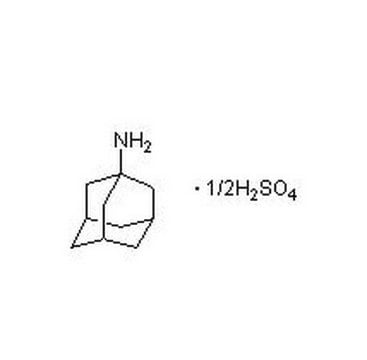A1260
Amantadine hydrochloride
≥98% (TLC), powder, NMDA receptor antagonist
Sinónimos:
1-Adamantanamine hydrochloride, 1-Adamantylamine hydrochloride, 1-Aminoadamantane hydrochloride, NSC 83653, Tricyclo[3.3.1.13,7]decan-1-amine hydrochloride
About This Item
Productos recomendados
product name
Amantadine hydrochloride,
form
powder
solubility
H2O: 50 mg/mL
ethanol: soluble
originator
Endo
SMILES string
Cl[H].[H][C@@]12C[C@@]3([H])C[C@@]([H])(C1)CC(N)(C2)C3
InChI
1S/C10H17N.ClH/c11-10-4-7-1-8(5-10)3-9(2-7)6-10;/h7-9H,1-6,11H2;1H/t7-,8+,9-,10-;
InChI key
WOLHOYHSEKDWQH-SOVZANNPSA-N
¿Está buscando productos similares? Visita Guía de comparación de productos
General description
Application
- to determine its effectiveness in reducing surgery-induced cognitive impairment
- to preincubate multipotent stem cells (MSCs), to investigate the cellular internalization pathway
- to determine whether amantadine-attenuated sepsis-induces neuroinflammation and dysfunction of learning and memory
- to preincubate primary cultured rat dental pulp stem cells (rDPSCs)
- to determine the pathway of internalization
Biochem/physiol Actions
Features and Benefits
signalword
Warning
hcodes
pcodes
Hazard Classifications
Acute Tox. 4 Oral
Storage Class
11 - Combustible Solids
wgk_germany
WGK 3
flash_point_f
Not applicable
flash_point_c
Not applicable
ppe
dust mask type N95 (US), Eyeshields, Gloves
Certificados de análisis (COA)
Busque Certificados de análisis (COA) introduciendo el número de lote del producto. Los números de lote se encuentran en la etiqueta del producto después de las palabras «Lot» o «Batch»
¿Ya tiene este producto?
Encuentre la documentación para los productos que ha comprado recientemente en la Biblioteca de documentos.
Los clientes también vieron
Artículos
Discover Bioactive Small Molecules for ADME/Tox
Discover Bioactive Small Molecules for ADME/Tox
Discover Bioactive Small Molecules for ADME/Tox
Discover Bioactive Small Molecules for ADME/Tox
Nuestro equipo de científicos tiene experiencia en todas las áreas de investigación: Ciencias de la vida, Ciencia de los materiales, Síntesis química, Cromatografía, Analítica y muchas otras.
Póngase en contacto con el Servicio técnico













